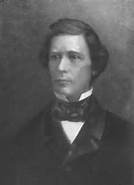The Wilmot Proviso
In the 1840s, an amendment to a spending bill attempted to stop the expansion of slavery, but it only drove the wedge deeper between North and South.
The U.S. was at war with Mexico in 1846. When it became likely that the U.S. would win and acquire new territory in the Southwest, members of Congress began debating how the territory would be administered. This included debating over whether or not slavery should be allowed.

U.S. Congressman David Wilmot
Most politicians had tried avoiding the divisive slavery issue ever since the Missouri Compromise of 1820. But now it was starting to divide the parties. Northern Democrats were expressing dissatisfaction with their southern counterparts, particularly southern Democratic President James K. Polk. Whigs tried keeping quiet to avoid exposing sectional differences in their party as well.
On August 8, President Polk requested $2 million to negotiate an end of the war with Mexico. He explained that paying Mexico for its land would achieve an honorable peace since the U.S. had not intended to acquire territory when it declared war. Congress was scheduled to adjourn in two days, so a bill was hastily drafted. As the bill was debated in the House of Representatives, Democratic Congressman David Wilmot of Pennsylvania introduced an amendment that became known as the Wilmot Proviso.
Under Wilmot’s amendment, slavery would be prohibited in any territory acquired from Mexico. The amendment’s language was derived from the Northwest Ordinance of 1787, which had administered and barred slavery in the future states of Ohio, Michigan, Indiana, and Illinois. Wilmot was chosen to introduce the proviso because he had consistently supported Polk and the southern Democrats.
The proviso’s introduction was not motivated by antipathy toward slavery. It was intended to keep blacks out of the new territories so that white free labor did not have to compete with black slave labor. The Wilmot Proviso introduced the notion of “free soil” in U.S. politics, or the notion that slavery should not be allowed to expand, but should be left alone where it already existed.
As an ally of slaveholders, Wilmot declared he had no “morbid sympathy for the slave,” instead submitting the proviso to uphold “the cause and the rights of white freemen.” Wilmot explained, “I would preserve to the free white labor a fair country, a rich inheritance, where the sons of toil, of my own race and color, can live without the disgrace which association with Negro slavery brings upon free labor.”
Even though it was unlikely that slavery would exist in the new territory because of the hostile southwestern climate, southerners considered the Wilmot Proviso an insult to their honor and a threat to their equality in the Union. As a result, the proviso accelerated the already growing sectional split among the political parties. The bill passed the House with the proviso attached, mainly because northerners outnumbered southerners. Northern Democrats and Whigs generally supported the bill, while southern Democrats and Whigs were opposed.
The Senate contained an equal number of northerners and southerners, and the bill passed only after Democrats removed the Wilmot Proviso. The revised bill was sent to the House for approval, but the House had already adjourned due to an eight-minute difference between the clocks in the House and Senate chambers. This meant that Congress was out of session, and the bill died.
The bill was revived when the next session of Congress began in December and Polk again asked for funding, this time $3 million. The “Three-Million Dollar Bill” was introduced in the House on February 8, 1847. The Wilmot Proviso was again included, but the language was changed from prohibiting slavery in any territory acquired from Mexico to prohibiting slavery in “any territory on the continent of America which shall hereafter be acquired.” The bill narrowly passed the House.
In the Senate, Democrat Thomas Hart Benton of Missouri sponsored a modified bill removing the Wilmot Proviso. The bill passed the Senate, and when it was returned to the House for approval, 22 Democrats reversed their original votes against the measure. The spending bill was enacted without the Wilmot Proviso.
The Mexican-American War ended in 1848 with the signing of the Treaty of Guadalupe Hidalgo. When the Senate debated ratification, northern senators tried adding the Wilmot Proviso to the treaty. Stephen Douglas of Illinois argued that debate over slavery in the territories was premature because the U.S. had not yet even acquired them. Southern senators defeated the motion, and the treaty was ratified without the Wilmot Proviso. This meant that there was no ban on slavery in the territory acquired from Mexico.
Even though the Wilmot Proviso was defeated, southerners considered the measure an example of northern contempt for the southern way of life. Southerners adopted the “Alabama Platform,” which declared that the federal government had no right to interfere with slavery anywhere.
The proviso also split the Democratic Party in the 1848 elections. Democratic presidential nominee Lewis Cass opposed the Wilmot Proviso, causing proviso supporters to leave and form the Free Soil Party. This was the first political party created to directly address the slavery issue on a national level.
Cass introduced the concept of “popular sovereignty,” or the notion that settlers in the new territories should decide for themselves whether or not to allow slavery. This only caused more controversy because it made the Democrats appear to be avoiding what was now an unavoidable issue.
The Whig Party was even more ambiguous regarding slavery. They nominated General Zachary Taylor, the hero of the Mexican-American War, for president. Taylor was a southern slaveholder who made no public statements about slavery. Even so, Taylor’s war hero status and the Democratic split were enough to tip the election to him.
Many historians fail to acknowledge that the Wilmot Proviso was introduced not for concern about the plight of slaves, but for keeping the new territories open for whites only by barring slaveholders from bringing blacks into the new region. The Wilmot Proviso was one of the first steps toward the national division that ultimately led to the War Between the States.





